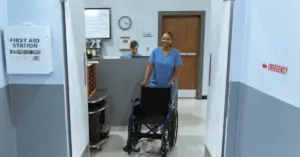Travel nursing offers adventure, variety, and unique experiences. But there might come a time when the allure of the open road gives way to the desire for stability and rootedness.
Transitioning from travel nursing to a stationary role isn’t just about changing job titles; it’s about reshaping your professional identity and adapting to new dynamics.
Embrace the Mental Transition
Just as travel nursing had its learning curve, moving to a stationary role will too. Understand that adapting mentally is the first step.
Are you someone who thrives on change, or are you seeking a familiar environment? While you might miss the thrill of new cities and hospitals, there’s also joy in forming lasting bonds with colleagues and patients.
Take a moment to visualize your desired future.
Gone will be the days of packing and unpacking, but in its place, you’ll find the joys of being a known face in the corridors, becoming a part of team traditions, and building deeper community ties.
Recognize Your Unique Skillset
As a travel nurse, you’ve cultivated resilience, adaptability, and quick thinking. These are invaluable traits.
When applying for stationary roles, emphasize your vast experiences. Highlight how you’ve adapted to varied work cultures, protocols, and technologies on the fly.
This isn’t just about showcasing your resume.
It’s about understanding that your journey as a travel nurse has equipped you with a unique perspective. You bring a diversity of thought, experience, and approach—assets any institution would value.
Establish Clear Communication
Entering a stationary role means you’ll be part of longer-term projects, committees, and initiatives. Communicate your experiences and learnings from different hospitals, which can be invaluable.
However, remember to strike a balance.
While your diverse experiences are beneficial, it’s essential to listen and learn. Understand the established protocols and be receptive to the institutional knowledge your new colleagues offer.
Seek Out Mentorship
While you’re a seasoned nurse, transitioning roles can present new challenges. Find a mentor in your new workplace to guide you.
A mentor can provide insights into the hospital culture, introduce you to key personnel, and offer tips to integrate seamlessly.
Build this relationship over time.
Regular check-ins, coffee breaks, and debriefing sessions can help you navigate your new role more effectively. Their guidance can be pivotal in ensuring your success.
Engage in Continued Learning
A stationary role might introduce you to specialties or procedures you haven’t frequently encountered on the road.
Embrace continued education. Attend workshops, seek certifications, and participate in seminars. These not only enhance your skills but also show your commitment to the new role.
Dive deep into your chosen specialty.
Unlike the broader experiences of travel nursing, stationary roles offer the chance to specialize and become an expert in a particular area. Harness this opportunity to grow and excel.
Nurture Workplace Relationships
One significant shift from travel to stationary roles is the longevity of workplace relationships.
Invest time in getting to know your colleagues, participate in team-building activities, and attend hospital events.
These relationships aren’t just professional.
Over time, your colleagues become your support system, sounding board, and friends.
Cultivating these bonds enriches your work environment and personal life.
FAQs For Transitioning Roles in Nursing
1. How can I address potential employer concerns about my transition from travel to stationary nursing?
Emphasize your adaptability, diverse experiences, and the unique perspective you bring. Assure them of your commitment to long-term growth in the stationary role.
2. Will I be able to leverage my travel nursing experiences for higher pay in a stationary role?
While your diverse experience is a strong asset, pay will often align with the hospital’s structure and the specific role. However, your varied background could position you favorably during negotiations.
3. How can I stay connected with the travel nursing community after transitioning?
Join online forums, attend travel nursing conferences, and maintain relationships with former colleagues. This network can offer support, insights, and even opportunities for future collaboration.
4. Can I transition back to travel nursing if I miss it?
Absolutely. Many nurses oscillate between travel and stationary roles throughout their careers, depending on personal and professional needs.
5. What should be my primary considerations when choosing a stationary nursing position?
Evaluate factors like hospital culture, opportunities for professional growth, work-life balance, benefits, location, and alignment with the hospital’s mission and values.
Transitioning from the dynamic world of travel nursing to a stationary role is a significant change.
With careful preparation, introspection, and a commitment to continued growth, you can make this shift seamlessly and thrive in your new nursing chapter.





